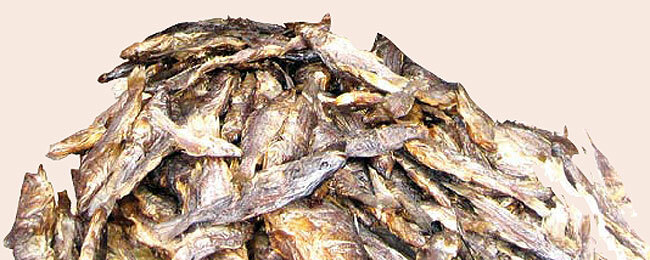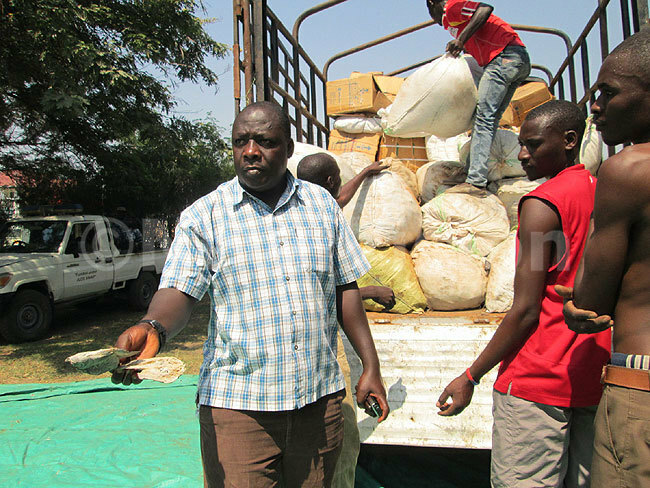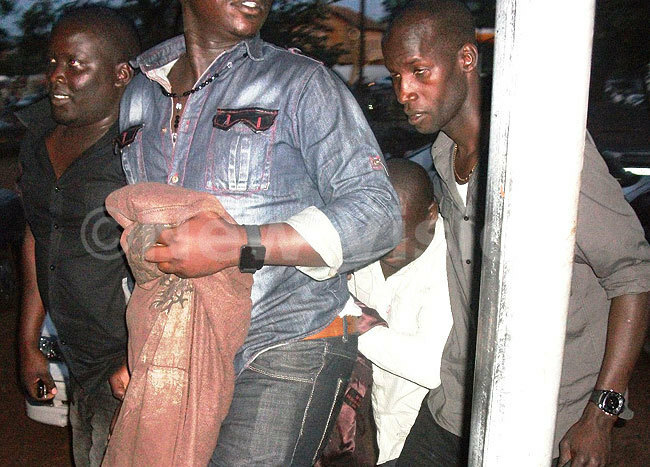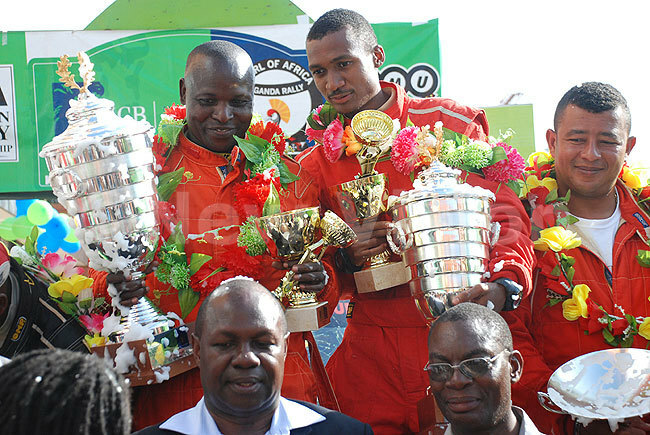How fishy deals got Lwakataka into trouble
Jul 20, 2014
For years, the public knew Ponsiano Lwakataka as a daring rally driver. He was so popular that parents even named their children after him.

By John Semakula & Dismus Buregyeya
For years, the public knew Ponsiano Lwakataka as a daring rally driver. He was so popular that parents even named their children after him.
But in the last few weeks, Lwakataka has tumbled from hero to a villain. The man who dominated headlines for winning motor rallies is now in the press for the wrong reasons.
Last week, Lwakataka appeared before a court in Masaka and was charged with dealing in immature fish. He was then remanded to Mubuku Government Prison. A court in Kasese also heard that before he was arrested, Lwakataka drew a gun on a law enforcement officer. But among fish traders, what Lwakataka is being accused of is nothing big.
A fish dealer in Kalangala told Saturday Vision that if you are not as brave as Lwakataka, the competition in the business will pull you down.

For many years, the public knew Ponsiano Lwakataka as a daring rally driver
Lwakataka’s right-hand man confesses
Abdullah Mukiibi, 28, who is based in Masaka, told Saturday Vision that he was Lwakataka’s right handman in the fish exporting business for seven years before they started experiencing problems.
“Whenever Lwakataka was not around, I took charge of transporting his fish through nine districts to Congo,” Mukiibi said.
But recently, when Lwakataka’s troubles began, Mukiibi returned his (Lwakataka’s) trucks. He said after he stopped working for Lwakataka, he (Mukiibi) joined the Police as an informer to fight trade in immature fish.
Mukiibi disclosed that many prominent traders in Kalangala, Masaka and Rakai who export fish to Congo, including Lwakataka, were dealing in immature fish.
“Lwakataka is just a victim of business rivalry. He had a lot of money and, as a result, he was a threat to his rivals. Whereas other traders would pay the fish owners after returning from Congo, Lwakataka would pay the owners half of the money before setting off.
Hence, he attracted a lot of business,” he said. Mukiibi also revealed that Lwakataka was unlucky because most of his business rivals were military officers.
“One of Lwakataka’s competitors is a former Internal Security organisation operative who recently swore to use acid to finish him off,” he said.

A source says dealers in immature fish hire route managers like Lwakataka to ensure their fish gets to Congo
Mukiibi added that the fish exporting business had become tricky.
“Your business rival can bribe a fisheries officer to get your truck impounded. And when your truck is impounded, fish owners shun you,” he said.
Mukiibi added that traders also had to pay fisheries officers sh500,000 per truck to let them transport the fish through their districts. He said the fisheries officers were also paid to warn truck drivers about the presence of law enforcement officers on the routes.
Involvement of soldiers
Following Lwakataka’s recent arrest, Saturday Vision learnt that two groups of soldiers were involved in fistfights to have him released.
Last week, a group of army deserters, allegedly acting on orders of a senior UPDF officer from Kampala, travelled to Masaka to arrest Lwakataka’s business rivals.

The western fisheries law enforcement officer, Adam Ssemujju displays an immature Nile Perch at Kasese police station. PHOTO/John Thawite
The senior UPDF officer who issued the order was reportedly bitter that Lwakataka’s rivals had sabotaged his business. However, a source said, when the group reached Masaka, it met an equal force from a group of soldiers attached to Kasijjagirwa barracks.
The two groups confronted each other and the mission flopped. The source said the Masaka group accused the Kampala group of carrying out an operation in their area without their knowledge. The Kasijjagirwa group further accused their rivals of using army deserters to execute the mission.
War among fish dealers
Lwakataka’s problems are connected to the booming fish business in the democratic republic of Congo, which Ugandan fish traders are struggling to control.
Lwakataka is also a prominent route manager. A route manager transports fish for a number of small business people, dealing in immature fish. Dealing in immature fish is illegal and the government deploys fisheries officers to arrest those involved.
A source said because of the threat, fish traders hire route managers, like Lwakataka, to ensure that their fish safely reaches the market in Congo. Saturday Vision learnt that a route manager earns sh1,700 for every kilogramme of fish he delivers to the market.
“In one month, a route manager can earn up to sh100m in commission,” the source said.

"Bodyguards" shield businessman Ponsiano Lwakataka (white shirt) from the press cameras at Masaka Central Police Station on July 16. PHOTO/Dismus Buregeya
He explained that with that amount of money, route managers are capable of bribing influential Police and army officers to help them out when their goods get impounded.
“To be hired as a route manager, you must convince fish owners that you are man enough to fight off any disruption on the route,” explained a source.
Saturday Vision learnt that many route managers have connections with security operatives. Lwakataka had made a name for himself among fish dealers as someone who never failed to deliver fish to the market. Little wonder that when his problems with the law started, he swore that no one would touch him because he was connected to power brokers in the army and the Police.
It was at that point that army commander Gen. Katumba Wamala intervened and threatened to deal with him. Route managers other prominent route managers on the Kalangala- Congo route include Robert Asiimwe, Haji Abdu Numba and Fulgensio Kavuma, a former ISO operative.
Asiimwe and Lwakataka were close friends before business disagreements separated them.
What others say
Haji Abdu Numba: Masaka fish traders’ boss
I was assaulted by Lwakataka. He almost disabled me when he poured a strange liquid into my eyes. I reported the matter to the Police in Masaka, but no action was taken against him.
Yasin Kalyango: Lwakataka’s former driver
I worked for Lwakataka for three years but the conditions were bad. Lwakataka would beat up people and security operatives. He feared no body. When i stopped working for him, Lwakataka made my life hell. His men poured a strange chemical in my eyes, which affected my sight. I reported the case at Masaka Police Station, but i was not helped.
Lenos Ngompek: Masaka RDC
The fish trade in Masaka is one of the biggest challenges I have dealt with. Lwakataka is to blame for failing to learn from past mistakes.
Who is Lwakataka?

Lwakataka (top left) ventured into motor rallying as early as 1999 and went on to dominate sports headlines as a winner
Lwakataka is said to have grown up in Kyotera, Rakai District.
Sources say he was a naughty boy who did all sorts of unusual things before he went into business at a young age. He was involved in the booming cross-border business between Uganda and Tanzania in the late 1980s and early 90s.
Lwakataka has been involved in the fish business for 22 years. Like many other businessmen, he became shrewd, learning how to deliver his goods to Tanzania safely. It is said that in the mid 1990s, after making a lot of money from the fish business, Lwakataka decided to settle in Rakai.
His welcome party in Kyotera was attended by security officials. “During the party, Lwakataka confessed his sins,” the source said.
It is said that after the confession and promising to denounce illegal trade, the Police reportedly picked interest in Lwakataka.
“They brought him on board as an informer to fight those involved in the illegal fish trade,” the source.
The source added that Lwakataka later became Brig. Elly Kayanja’s close friend and helped him fight robbers during Operation Wembley.
Lwakataka ventured into motor rallying in 1999. Sources say that Lwakataka was thrilled by car racing, adding that he had mastered the routes during the time he exported fish to Tanzania.
During his business trips, he would reportedly be involved in car chases by security operatives, whom he would comfortably dodge. Until recently, he kept one foot in the fish business and the other in sports.
